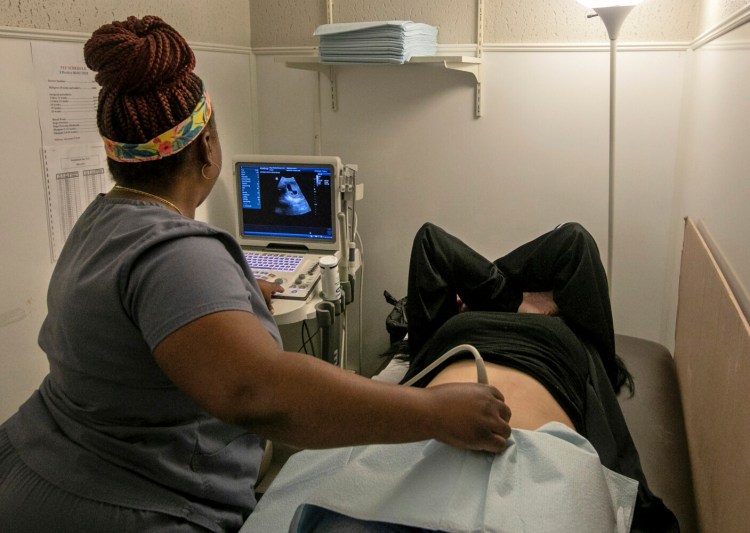Workers worried about the criminalization of abortion in certain states say they’re willing to move elsewhere, but it’s easier said than done.
More than two in five working adults who say they’re concerned about losing abortion options for themselves or a family member are open to relocate to another state if they could keep their current job and pay. That’s according to a Morning Consult survey of more than 4,400 respondents conducted for Bloomberg News. That said, an equal amount noted the process would be difficult, even if they held onto their job.
In the wake of the U.S. Supreme Court’s decision to overturn Roe v. Wade, so-called haven states have been preparing for an influx of people from around two dozen states where abortion is set to be criminalized or highly restricted. Yet a broad and more permanent migration has yet to materialize, with a majority of workers noting a lack of expanded employer benefits for abortion-related costs. And with consumer prices soaring at the fastest pace in four decades, relocation is a costly prospect.
“It’s incredibly difficult for people to uproot their lives,” Joanna Piacenza, Morning Consult’s head of industry intelligence, said in an interview. “We’re not going to see a mass exodus to states with access, especially as most of the people impacted are those least likely to be able to move, being less affluent.”
Forty-four percent of adults surveyed by Morning Consult said they were somewhat or very concerned about themselves or a family member losing access to abortion services.
Yet more than half of them also said it would be difficult to take a pay cut or leave their current job in order to move to a state where such access exists. Only about a third said they would consider those two options.
Beyond a specific need to access abortion, workers may also be enticed to move to states that allow for the procedure because it aligns with their own principles.
With various areas in the U.S. having become more politically polarized in recent decades, individuals have shown a tendency to prefer moving to and living in locations with people who share their views, according to a 2019 study by Pennsylvania State University researchers.
Yet setting aside money for relocation is a tall order, with prices for household necessities like food, gas and energy continuing to post outsized increases.
Moving costs rose 9 percent in the first five months of 2022 compared with the same period a year ago, according to HireAHelper. They’re set to rise further during the summer, a peak season for relocations.
Beyond moving expenses, another major barrier for workers is the high cost of living in many of the states where abortion has strong protections relative to states where abortion is highly restricted.
The Morning Consult survey findings highlight how Roe’s dismissal has thrust part of the social safety net into employers’ hands, forcing hard decisions on human-resources managers and employees alike.
While blue-chip employers like Citigroup Inc. and Hewlett Packard Enterprise Co. have offered reimbursement benefits for out-of-state reproductive health care for employees in states hostile to abortion, they’re in the minority. Less than 15 percent of those polled by Morning Consult said their employer has taken any steps to expand benefits in the wake of the Supreme Court ruling.
More than a quarter of U.S. workers in the private sector have no health-care benefits at all, according to labor department data, and most of the people getting abortions are lower-income workers, according to the Guttmacher Institute, a research organization that supports access to the procedure.
The Morning Consult poll follows one last week from management consulting firm Gartner, which found that a majority of 220 HR executives either don’t plan to change their current health-care offerings or are still evaluating options.
New abortion benefits remain out of reach for most U.S. workers
Companies looking to signal their support for abortion rights have mostly offered up reimbursement for travel and costs for employees who have to get reproductive care out-of-state, but Gartner found that less than one in four currently offered the travel benefit.
Retail giant Walmart Inc., the largest private U.S. employer, has so far not said it will extend any new reproductive benefits.
“This is a huge challenge for companies, and they’re often not sure what to do,” said Brian Kropp, head of HR research at Gartner. “They spend a lot of time talking about their ‘values,’ and now those values are being tested.”
Copy the Story LinkSend questions/comments to the editors.



Success. Please wait for the page to reload. If the page does not reload within 5 seconds, please refresh the page.
Enter your email and password to access comments.
Hi, to comment on stories you must . This profile is in addition to your subscription and website login.
Already have a commenting profile? .
Invalid username/password.
Please check your email to confirm and complete your registration.
Only subscribers are eligible to post comments. Please subscribe or login first for digital access. Here’s why.
Use the form below to reset your password. When you've submitted your account email, we will send an email with a reset code.